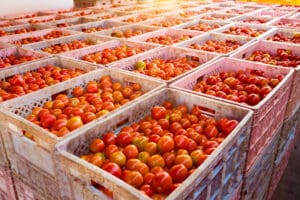
UK businesses spent as much as £65 million last year on licences to export food and agricultural products to the EU – costs the government has pledged to eliminate within the next 18 months.
Figures published by the Department for Environment, Food and Rural Affairs on Tuesday showed 328,727 export licences were issued in 2024, each costing between £113 and £200. That equates to a total burden of between £37 million and £65 million for British firms.
The Cabinet Office minister for European negotiations, Nick Thomas-Symonds, will set out plans on Wednesday to remove the scheme entirely as part of a new agricultural and food products agreement with Brussels, to be finalised by 2027.
Speaking at an event hosted by The Spectator and chaired by senior Brexiteer Michael Gove, Thomas-Symonds will argue that closer alignment with the EU is now firmly in the national interest.
He is expected to launch a direct attack on Reform UK leader Nigel Farage, saying: “Nigel Farage’s manifesto at the next election will say in writing he wants to take Britain backwards, cutting at least £9bn from the economy, bringing with it a risk to jobs and a risk of food prices going up. Nigel Farage wants Britain to fail. His model of politics feeds on it, offering the easy answers, dividing communities and stoking anger.”
Labour’s pro-EU positioning contrasts sharply with the approach of the Conservatives and Reform UK. Tory leader Kemi Badenoch has accused the government of “being dragged back” into the EU, while Farage has labelled the policy a “Brexit betrayal”.
The DEFRA report accompanying the figures said the costs of export licences had hit smaller businesses particularly hard.
“These firms often lack the capacity and economies of scale to manage the administrative and compliance demands associated with non-tariff measures,” the report said. “This has created a competitive disadvantage between smaller firms and larger operators with in-house capability – although all stakeholders report increased costs.”
The current system, introduced under the Conservative government’s post-Brexit trade deal, requires exporters of products such as meat, fish, fruit and vegetables to secure licences to access the EU market.
Labour says its new deal will reduce border checks and eliminate the need for such licences, cutting red tape for exporters.
In April, British supermarkets and food producers, including Marks & Spencer and Sainsbury’s, urged Brussels to complete negotiations on the new goods and agriculture agreement, warning that the current system had imposed “unnecessary red tape” and damaged competitiveness.
A Labour spokesperson added: “The Tory Brexit deal was a complete failure, saddling businesses with costs they shouldn’t have had to face and harming our economy in the process. But Nigel Farage and Kemi Badenoch have both committed to ripping up Labour’s agreement and keeping this damaging red tape in place.”
For now, Britain’s food exporters face at least another year of paperwork and added expense. But ministers insist that a new deal with Brussels by 2027 will finally remove one of the most costly non-tariff barriers created by Brexit.
